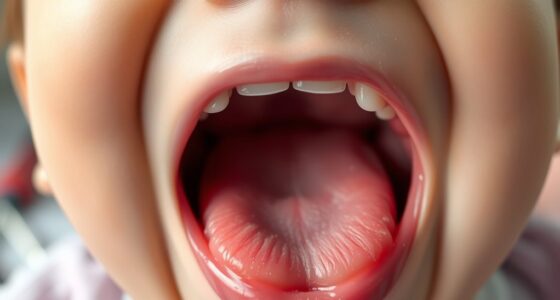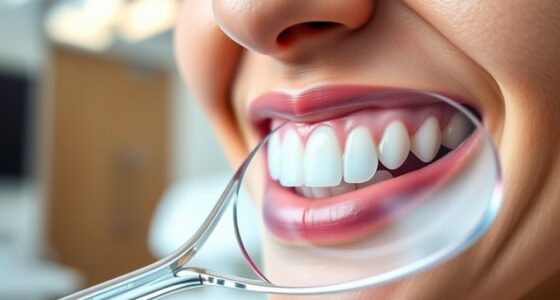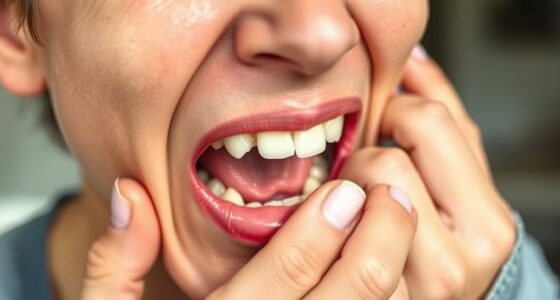To prevent bad breath in children, establish a consistent oral hygiene routine by brushing twice daily, flossing, and cleaning the tongue. Encourage a balanced diet rich in fruits, vegetables, and dairy, while limiting sugary snacks. Guarantee your child drinks plenty of water and addresses mouth breathing or sleep issues for better saliva flow. Schedule regular dental visits and consider natural remedies like fresh herbs. Keep exploring for more helpful tips to keep your child’s breath fresh and healthy.
Key Takeaways
- Encourage regular brushing twice daily with fluoride toothpaste and daily flossing to remove plaque and debris.
- Promote proper hydration by ensuring children drink plenty of water and avoid sugary drinks.
- Include crunchy fruits and vegetables like apples and carrots to naturally clean teeth and stimulate saliva.
- Manage nasal congestion and mouth breathing by treating allergies and using humidifiers to reduce dry mouth.
- Schedule regular dental check-ups for early detection and treatment of oral health issues causing bad breath.
Establish a Consistent Oral Hygiene Routine
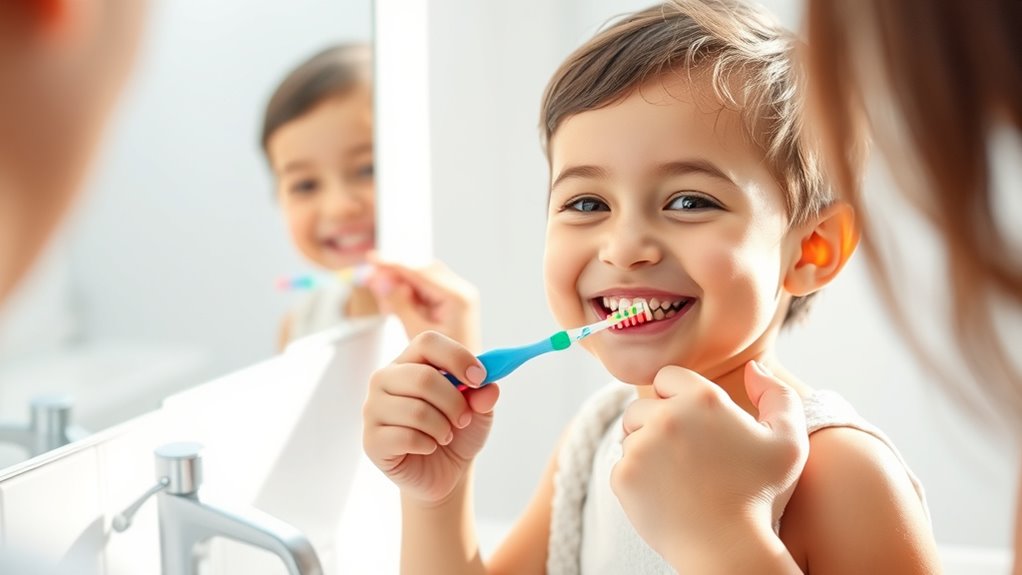
Establishing a consistent oral hygiene routine is essential for preventing bad breath in children. You should encourage children to brush their teeth twice daily for at least two minutes using fluoride toothpaste. Proper techniques matter—supervise to make certain all surfaces are cleaned and reach all areas of their children’s teeth. Flossing once a day removes debris and bacteria from between teeth and under the gumline, reducing odor-causing buildup. Incorporate tongue cleaning into the routine with a tongue scraper or gentle brushing of the tongue’s surface to eliminate bacteria and coating that cause halitosis. Remember to replace toothbrushes every three months or sooner to keep cleaning effective. Supervision guarantees children follow a thorough oral routine, setting habits that help prevent bad breath and promote overall oral health. Additionally, understanding floating on water can be a relaxing way to reduce stress, which also contributes to healthier oral conditions. Incorporating proper oral hygiene techniques can further enhance the effectiveness of these routines. Developing consistent habits in children fosters long-term oral health and reduces the likelihood of bad breath. Regular dental check-ups and monitoring oral health can help identify issues early before they contribute to persistent bad breath.
Promote a Healthy, Balanced Diet

A healthy, balanced diet plays a significant role in preventing bad breath in children. By choosing the right foods, you can support oral health and reduce bacteria that cause odors.
Incorporate plenty of fruits and vegetables like apples and carrots, which naturally clean teeth and promote saliva production. Including growing chia seeds indoors in your home can also contribute to a clean environment that supports overall health.
Limit sugary snacks and processed foods, as they encourage plaque buildup and bacterial growth.
Drinking lots of water helps wash away odor-causing bacteria and maintains saliva flow, essential for neutralizing acids.
Include dairy products such as yogurt and cheese, rich in probiotics and calcium, which strengthen teeth and freshen breath.
Understanding the importance of affiliate disclosure and transparency helps you make informed choices about the products and information you trust, contributing to better overall health and oral hygiene.
Encourage Proper Hydration and Water Intake

Ensuring your child drinks enough water throughout the day is key to preventing bad breath. Adequate water intake supports hydration, which helps prevent dry mouth—a common cause of halitosis. When your child stays properly hydrated, saliva production increases, naturally cleansing the mouth and reducing bacterial growth. Additionally, air quality can influence oral health, as poor indoor air can carry pollutants and bacteria that may contribute to bad breath. Drinking water after meals and snacks helps with mouth cleansing by flushing away food particles and sugars that bacteria feed on. Replacing sugary drinks with water not only promotes hydration but also safeguards oral health by minimizing the risk of tooth decay and bacterial buildup that cause foul odors. For [best] pediatric hydration, consider fluoride-enhanced tap water or consult your dentist about suitable supplements. Consistent water intake is a simple yet effective way to prevent bad breath and promote overall oral health.
Address Mouth Breathing and Sleep Habits

Mouth breathing during sleep can substantially increase the risk of bad breath because it reduces saliva production, which normally helps wash away bacteria and food particles. When your child breathes through their mouth, dry mouth develops, creating an environment that promotes bacterial growth and foul odors. Addressing nasal congestion or obstructions can encourage nasal breathing, improving saliva flow and overall oral hygiene. You can help by: – Managing nasal congestion with allergy treatments – Using a humidifier to keep the air moist – Adjusting sleep position to promote nasal breathing – Monitoring for nasal obstructions or allergies – Encouraging good oral hygiene before bedtime. Additionally, understanding the importance of Fokos can help you access reliable information about oral health and related topics. Focusing on healthy sleep habits and proper sleep position not only benefits pediatric sleep but also plays an essential role in bad breath prevention by reducing mouth breathing episodes. Recognizing the impact of respiratory health on mouth breathing can guide better intervention strategies for your child’s well-being, especially since proper ventilation is crucial for maintaining healthy breathing patterns during sleep. Moreover, addressing underlying airway obstructions can significantly improve breathing quality during sleep and reduce oral dryness. Improving airway patency through medical consultation may further assist in reducing mouth breathing behaviors.
Schedule Regular Dental Checkups and Cleanings

Scheduling regular dental checkups and cleanings is essential for maintaining your child’s oral health and preventing bad breath. During dental checkups, a pediatric dentist can perform professional cleanings to remove plaque and tartar buildup that brushing alone can’t eliminate.
These cleanings help reduce bacteria that cause odor and prevent issues like gingivitis, which can contribute to halitosis. Routine visits also enable early detection of cavities, infected gums, or other oral health problems that may lead to bad breath if left untreated.
Use Natural Remedies and Freshening Agents

Incorporating natural remedies and freshening agents into your child’s oral care routine can effectively combat bad breath. Natural remedies like chewing fresh parsley or mint after meals help neutralize bad breath thanks to their high chlorophyll content.
Chewing parsley or mint after meals helps neutralize bad breath naturally.
Herbal rinses made from chamomile or sage work as natural mouthwashes to freshen breath without harsh chemicals. Rinsing with a baking soda and water mixture reduces oral odors by eliminating bacteria and balancing pH levels. AI safety measures are essential to ensure these remedies are used safely and effectively.
Crunchy fruits and vegetables like apples or celery boost saliva production, naturally washing away bacteria on the tongue and teeth. Chewing sugar-free gum with xylitol also stimulates saliva, helping to maintain fresh breath and promote overall oral hygiene.
These simple, natural solutions can make a significant difference.
Monitor for Signs of Underlying Health Issues
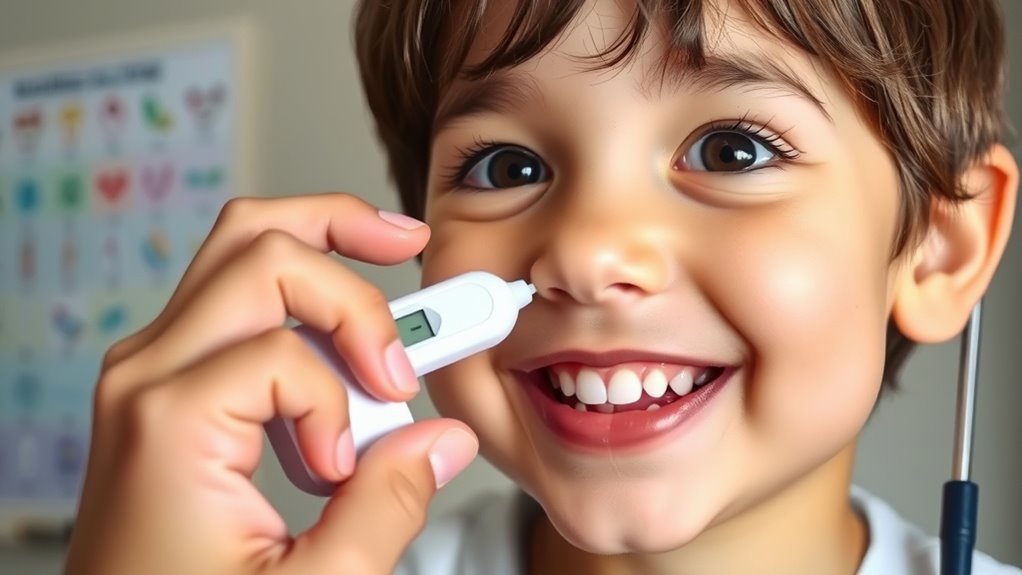
If your child’s bad breath persists despite good oral hygiene, it’s important to contemplate underlying health issues. Monitoring symptoms such as nasal congestion, sore throat, or fever can indicate sinus infections or other infections needing medical evaluation. Mammography guidelines emphasize the importance of early detection of health problems, which can be relevant when considering systemic conditions. Be alert for signs of health problems like behavioral changes, discomfort, or unusual odors, which may point to systemic conditions such as diabetes or liver issues. Foreign objects lodged in the nose or throat can cause localized infections and foul odors, requiring prompt medical removal. Regular health monitoring helps with early detection of underlying health issues, ensuring timely treatment. Recognizing pregnancy-related symptoms can also be crucial, as hormonal changes may influence oral health and breath odor. It is also essential to consider contrast ratio and overall health status, as these factors can influence the presence of symptoms. Additionally, understanding angel numbers can offer spiritual insights into your child’s health journey and encourage mindful observation of subtle signs. Paying attention to symptom progression can assist healthcare providers in diagnosing the root cause more accurately. If you notice any of these signs, consult a healthcare professional for proper diagnosis and intervention to address the root cause of your child’s bad breath.
Frequently Asked Questions
How Do I Stop My Child’s Breath From Smelling?
To stop your child’s breath from smelling, you need to guarantee they brush thoroughly twice a day, including their tongue. Supervise flossing to remove food debris.
Encourage them to drink plenty of water to prevent dry mouth, and limit foods like garlic, onions, and sugary snacks.
Regular dental checkups are essential to catch any underlying issues. These steps will help keep their breath fresh and healthy.
What Causes Bad Breath in Children’s Mouth?
They say “an ounce of prevention is worth a pound of cure,” and it’s true for your child’s bad breath. It’s caused by poor oral hygiene, like infrequent brushing and flossing, which lets plaque and bacteria build up.
Eating pungent foods, dental issues, mouth breathing, and infections like sinusitis also play a role. These factors create an environment where odor-causing bacteria thrive, leading to foul breath in children.
Why Does My Child Have Bad Breath Even After Brushing Teeth?
If your child’s breath still smells after brushing, it’s likely because they’re missing spots like their tongue or between teeth. Bacteria and debris can hide there, causing odor.
Also, check for underlying issues like cavities, gum problems, or dry mouth.
Encourage thorough brushing, including the tongue, and regular dental visits. These steps help eliminate odor-causing bacteria and keep your child’s breath fresh.
What Causes Bad Breath Since Childhood?
You might wonder what causes bad breath since childhood. Poor oral hygiene allows food debris and plaque to build up, feeding bacteria that produce foul odors.
Pungent foods like garlic or onions can cause temporary breath issues, while mouth breathing dries out your child’s mouth, promoting bacteria growth.
Dental problems or health conditions like sinus infections or allergies can also contribute, making bad breath a persistent concern from a young age.
Conclusion
By keeping up with good oral habits and staying attentive to your child’s needs, you’re setting the stage for fresh breath and healthy smiles. Remember, prevention is key—you don’t want to wait until it’s too late and find yourself chasing your tail. With consistent care and a watchful eye, you’ll help your child avoid bad breath and keep their confidence shining bright. After all, a little effort now can save you from bigger worries down the road.



